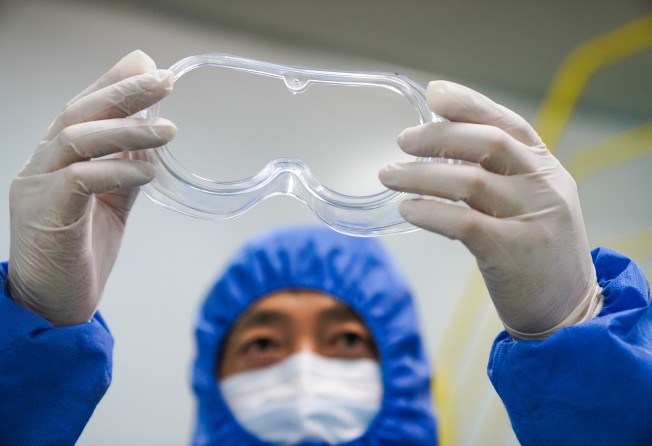University of Hong Kong study finds eyes are ‘important route’ for coronavirus, up to 100 times more infectious than Sars
- Researchers from HKU’s school of public health reveal the coronavirus is up to 100 times more infectious through the eyes and airways than Sars
- Study in The Lancet Respiratory Medicine says that explains ‘higher transmissibility’ of Covid-19, compared with the 2003 contagion

The eyes are an important route for the coronavirus into the human body, according to University of Hong Kong research which found the strain was up to 100 times more infectious than severe acute respiratory syndrome and bird flu in two facial orifices tested by the public health experts.
Laboratory tests revealed the “virus level” of SARS-Cov-2 – the strain of coronavirus that causes the Covid-19 disease – was far greater than for Sars in the upper respiratory airways and conjunctiva, the cells lining the surfaces of the eyes.
The team led by Dr Michael Chan Chi-wai, from HKU’s school of public health, became among the first researchers worldwide to provide evidence the coronavirus can infect humans through both entry points when it published its findings in the latest issue of The Lancet Respiratory Medicine.
“We culture tissues from the human respiratory tract and eyes in the laboratory and applied them to study the SARS-Cov-2, comparing it with Sars and H5N1. We found that SARS-Cov-2 is much more efficient in infecting the human conjunctiva and the upper respiratory airways than Sars, with virus level some 80 to 100 times higher,” Dr Chan said.
“This explains the higher transmissibility of Covid-19 than that of Sars. This study also highlights the fact that eyes may be an important route of SARS-CoV-2 human infection,” added Dr Chan.
The study reinforces advice to the public not to touch their eyes and to wash hands regularly to avoid infection, after the university researchers previously found the coronavirus could survive as long as seven days on stainless steel surfaces and plastic.
Dr Chan said: “Although there are signs that the Covid-19 epidemic is getting more stable in Hong Kong, the situation elsewhere in the world is still serious. There are still many new cases reported every day in, say, Russia and Europe. We should not let our guard down.”
The findings from Dr Chan’s team and others challenge the widely held assumption in the earliest stages of the health crisis that medical staff would be adequately protected with N95 masks and protective clothing, without the need for specialist glasses.
In late January, renowned Peking University First Hospital respiratory specialist Wang Guangfa reported that he had come down with a fever and catarrh, about three hours after his eye had developed conjunctivitis on his return to Beijing from Wuhan. Wang was later confirmed with Covid-19, with his eyes suspected as the route of infection.
The outbreak of Covid-19 was first reported in the central Chinese city of Wuhan late last December. It has since developed into a pandemic, infecting more than 3.77 million people, claiming over 264,000 lives across the world, according to data compiled by researchers at Johns Hopkins University, as of Thursday night.
Hong Kong recorded its first cases on January 23 and now has 1,044 confirmed infections, and four related deaths.
With the epidemic easing in Hong Kong, some government restrictions on social gatherings and the operation of businesses are being relaxed from Friday.
The Sars crisis took hold of Hong Kong in 2003, where the infected total was 1,755, with 299 related deaths.
Help us understand what you are interested in so that we can improve SCMP and provide a better experience for you. We would like to invite you to take this five-minute survey on how you engage with SCMP and the news.
